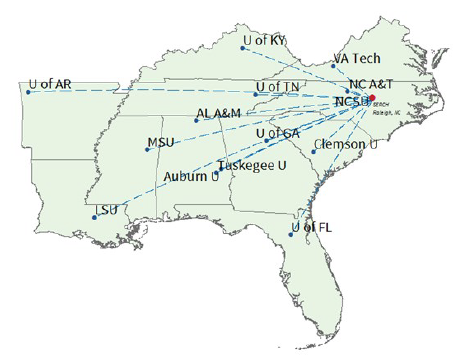Weather & Climate Decision Tools for Farmers, Ranchers, and Land Managers Conference to be held Dec 5-7 in Gainesville, FL

Adaptation Resources for Agriculture Now Available
The long awaited, easy to use, Adaptation Resources for Agriculture: Responding to Climate Variability and Change in the Midwest and Northeast is now available at the National Climate Hubs website under the Adaptation Assistance menu.

Add this new USDA report to your education and outreach action plans for helping producers prepare for, cope with, and recover from extreme weather and uncertain climate conditions. Read it to gain perspective on climate adaptation in agriculture and understand the general effects of climate change on agriculture and natural resources in the region. More importantly, use the resources to put climate change information into action: (Chapter 3) Adaptation Strategies and Approaches, a synthesis of peer-reviewed climate change adaptation responses, (Chapter 4)Adaptation Workbook, an adaptive management driven process for adapting agriculture to climate change, and (Chapter 5)Adaptation Workbook examples, four real-world examples that demonstrate how to use the workbook on typical farms in the region. While the Adaptation Workbook is designed primarily for use by individual famers, the rest of the report is designed for use by extension agents, ag advisors, and conservationists to enhance their climate education and training programs. Open Report |
CLN/CSI Webinar: Minnehaha Stormwater Adapatation and NOAA’s Climate Explorer Tool – November 3rd
New Research on Climate Change Attitudes of Southern Forestry Professionals
 Two new papers have just been published in the Journal of Forestry that explore attitudes of Southern Foresters towards climate change. The first paper entitled “Climate Change Attitudes of Southern Forestry Professionals: Outreach Implications” is designed to to enhance educators’ understanding of foresters’ climate change attitudes. Interestingly, the results of this study suggest that demographic characteristics of foresters shape climate change attitudes in ways comparable to those of the general public.
Two new papers have just been published in the Journal of Forestry that explore attitudes of Southern Foresters towards climate change. The first paper entitled “Climate Change Attitudes of Southern Forestry Professionals: Outreach Implications” is designed to to enhance educators’ understanding of foresters’ climate change attitudes. Interestingly, the results of this study suggest that demographic characteristics of foresters shape climate change attitudes in ways comparable to those of the general public.
The second paper, “Nonindustrial Private Forest Landowner Beliefs Toward Climate Change and Carbon Sequestration in the Southern United States” expands the analysis to include carbon sequestration and focuses on private landowners. The study found that landowners that have a neutral opinion on climate change could provide a receptive target audience for climate change education. Both papers provide useful insight into how climate change training might be designed for these audiences.
Southeast Regional Climate Hub Holds First Meeting of Network of Partners
The first meeting of the Southeast Hub’s Network of Partners was convened in July. Members include representatives from all of the region’s Land-grant Universities and non-profit organizations. The group discussed how to best translate research findings to outcomes on the ground and work together to address critical needs of southeastern land managers. If you are interested in becoming a SERCH partner contact Steve McNulty at smcnulty@fs.fed.us.
